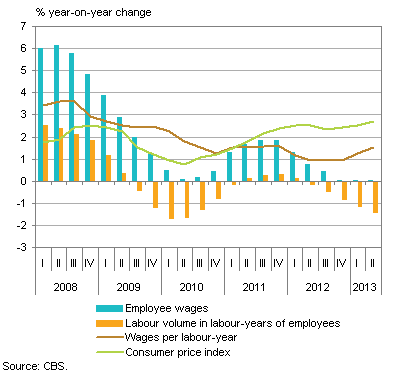Continued fall for disposable household income

Real disposable household income in the Netherlands was 2.6 percent lower in the second quarter of 2013 than twelve months previously. Disposable income has been falling for two years now. The reason for this is that, in terms of euros, income has not been rising. As a result, the real decrease in disposable income is in the same order of magnitude as the rate of inflation. All changes described here are moving annualtotals: the data for the four quarters of a year are combined and assigned to the last quarter of that year.
Contributions to year-on-year change in real disposable income

Inflation has largest negative effect on income
Inflation had the largest negative impact on real disposable income in the second quarter of 2013, accounting for 2.7 percentage points. Increases in taxes and social security contributions pushed income down further, just as income from production. Opposite these negative factors, increases in social benefits in particular and also remuneration of employees and property income had a positive effect on income. Although remuneration of employees did rise, the increase was small and moreover only caused by the rise in employer-paid social security contributions. Together with wages, these contributions make up the total remuneration of employees, but do not have a direct effect on disposable income as they are directly transferred from households to the government and pension funds.
Wage developments

No rise in wages received by households
Total wages received by households in the last three quarters have risen hardly or not at all compared with twelve months previously. This has had a large negative effect on disposable income, as wages are a key component of disposable income. If income from wages does not rise, overall income of employees will be nibbled away by inflation. The growth of wages received is affected by employment on the one hand, and by wages per labour-year on the other. As a result of the crisis, employment has dropped sharply in recent years, pushing down the volume of labour since the end of 2011. Both the crisis and lower employment levels have also had a restraining effect on wage developments. Increases in wages per labour-year have been smaller than inflation for two and a half years now, although the rise was slightly larger in the second quarter of 2013, at 1.5 percent.
Social benefits received compared with 2nd quarter 2011
More income from unemployment benefit
Employees who lose their job, and thus their income from wages, receive partial compensation through social security: they may be entitled to unemployment benefit and - under certain conditions - subsequently to income support. Income from social benefits has indeed increased, pushing up disposable income. Income from unemployment benefits rose by 340 million euros from the second quarter of 2011 to the second quarter of 2013; income from income support rose by 62 million euros. Although it is significant, this increase is still a lot smaller than that resulting from population ageing; income from pension payments rose by 1.4 billion euros in the same period.
Source: StatLine, Sector accounts; key figures
